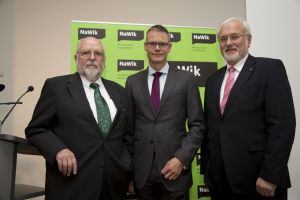How can a general audience be fascinated by scientific topics? Where can students or scientists learn to give a convincing interview or a captivating presentation? These questions are answered by an institute that was opened in Karlsruhe today. The National Institute for Science Communication, briefly called NaWik, is now starting to train scientists and students for the dialog with the public. NaWik is an Institute of the Klaus Tschira Foundation and Karlsruhe Institute of Technology (KIT) in cooperation with the publishing company Spektrum der Wissenschaft. For a period of five years, the NaWik will be funded with up to EUR 10 million by the Klaus Tschira Foundation.
The training provided by NaWik will cover understandable writing, clear presentations of complex relationships, blogging, etc. The lecturers are highly experienced, as they studied sciences and worked as journalists for printed or online magazines or broadcasting stations. The Scientific Director, Professor Dr. Carsten Könneker, is editor-in-chief of the Spektrum der Wissenschaft publishing company. NaWik will offer its courses not only at KIT. The trainings can be booked all over Germany and may be adapted to the customers’ needs, if desired. More information can be found at www.nawik.de.
Klaus Tschira justifies the commitment of his foundation: “I am firmly convinced of the fact that science is obliged to deliver, i.e. to convey its findings and ways of thinking to the public.” Tschira also underlines that the scientists should not be left out in the rain, but familiarized with the fundamentals of good science communication during their education already. NaWik offers modules for master and Ph.D. students at KIT and plans to further develop and to integrate them in selected study programs. These offers shall address all universities and non-university research institutes throughout Germany.
For KIT President Professor Eberhard Umbach, NaWik is active at the interface between high-technology research and generally understandable communication of science to society: “The NaWik courses will help young scientists better communicate with the target groups outside of the scientific community and make the objectives and findings of their research more transparent and understandable,” Umbach emphasizes. Another major activity of KIT in the field of science communication and science journalism is the new bachelor program on “Science – Media – Communication” at the Department of Humanities and Social Sciences. This bachelor program will be followed by a future master program. Carsten Könneker was just appointed the first professor for this program at KIT. The experienced science journalist looks forward to starting his new work in Karlsruhe: “It is very exciting to be able to contribute my vast experience to the development of NaWik and to the new studies program. I am pleased to do this parallel to my work as editor-in-chief.”
The Klaus Tschira Foundation supports natural sciences, mathematics, and informatics and their appreciation in society. With its training offer “Sag’s klar” (Say it clear), it has been supporting communication competence of scientists since 2001. Since 1997, young scientists, who explain their excellent research in an understandable way, have been awarded the Klaus Tschira prize for understandable science. Further information is available at www.klaus-tschira-stiftung.de
The Spektrum der Wissenschaft publishing company publishes “Spektrum der Wissenschaft" as well as the magazines "Gehirn&Geist" (Brain/Spirit), "Sterne und Weltraum" (Stars and Space), and "epoc". In all four journals, researchers report about their work in a generally understandable manner. More than 70 scientists of various disciplines blog on the SciLogs.de platform operated by “Spektrum”. The portal Spektrum.de is a leading platform for up-to-date science reporting. www.spektrum.com
In close partnership with society, KIT develops solutions for urgent challenges – from climate change, energy transition and sustainable use of natural resources to artificial intelligence, sovereignty and an aging population. As The University in the Helmholtz Association, KIT unites scientific excellence from insight to application-driven research under one roof – and is thus in a unique position to drive this transformation. As a University of Excellence, KIT offers its more than 10,000 employees and 22,800 students outstanding opportunities to shape a sustainable and resilient future. KIT – Science for Impact.

